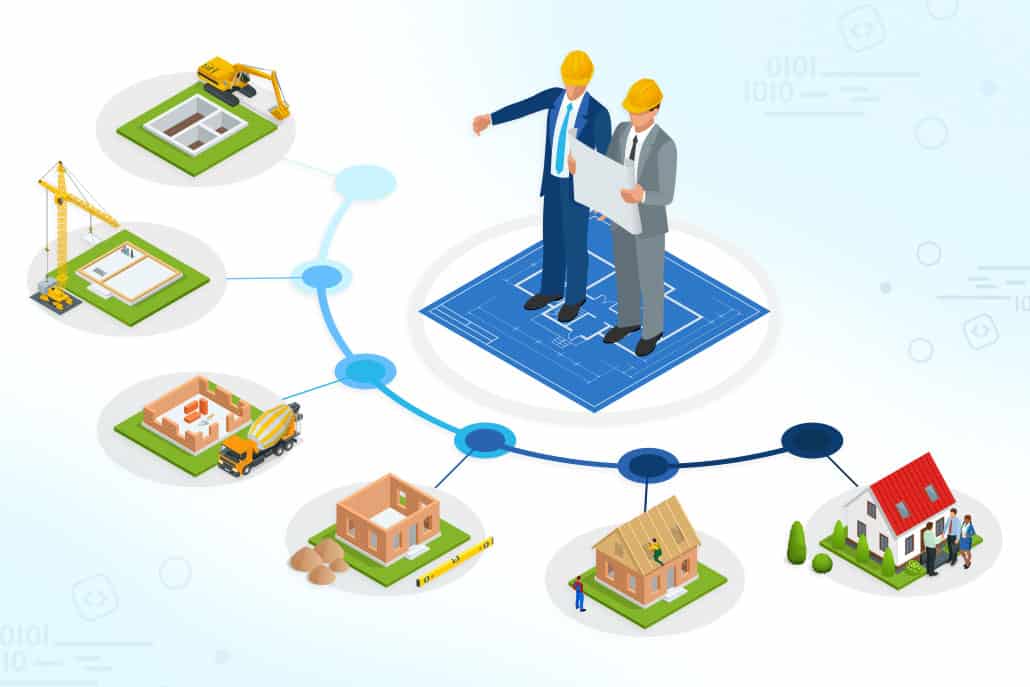In this lightning-paced world, businesses rely on state-of-the-art technology to stay competitive, adaptable, and relevant. That means finding the right software company for your business problems is a must.
We often say creating a custom solution for businesses is like building a house – software begins with a vision and requires careful preparation, planning, communication, and labor. And just like building a house, your technology partner has to have multiple roles so your software meets high demands.
Roles of Your Technology Partner
Quality homes are not built in a day; neither is your custom software. A considerable amount of preparation and effort is needed for both.
From choosing a plot of land to moving into your new house, a team of experts works together to make a well-built home that lasts years. The same applies to building a software solution for your business – your technology partner has similar roles, just with different tools. These roles include:
- The Architect. Plans your project’s data architecture – they begin with high-level design concepts and work with the team through every stage of the building process.
- The Builder. Develops the code and programming for your project.
- The Inspector. Checks the code for security measures and tests it on quality.
- The Interior Designer. Enhances the user interface and experience; creating a pleasing balance between aesthetics and functionality so it feels seamless, easy to work with.
Your technology partner dedicates a significant amount of time and effort to create a solution for your business. It is critical to choose the right one for your needs. How do you start?
Let’s look at some questions you can ask that will help you find the right technology partner.
Questions To Discover The Right Technology Partner
Here are some questions to consider when considering a custom software company for your company.
Do They Follow Best Building Practices?
A best practice for creating a quality house is to start with a strong structure. For your custom solution, software architecture helps you make important decisions early in your project. Good decision-making not only gives your project a blueprint, but also prevents code bloat (excessive, wasteful code), and mitigates negligent work.

Having a plan laid out allows your technology partner to get it right the first time, saving you the cost of retrofitting poorly written code.
Do They Update You On Construction?
As your technology partner works on your project, you want to see how progress is going – an iterative approach is powerful for finding problems early. Issues come up, but open communication mitigates problems; the sooner they are found, the cheaper and easier it is to fix them.
Does your technology partner provide “this-is-where-we-are-at” on your project’s progress? Even if nothing has changed, frequent follow-ups provide many opportunities. These include:
- Discovering vulnerabilities in the software while it is being coded.
- Examining the code before each release.
- Finding the source of any problems causing delays.
For example, having your builders confirm the color of a wall before the first coat of paint is even applied. That way, you understand what you are getting.
Do They Set A Clear Budget and Time Estimate?
Expectations, deadlines, budgets, timelines: These have to be clearly defined. Communication is key and having a clear budget and time estimates allow you to focus on growing your core business.
- Do they provide a clear blueprint?
- Are they setting clear budgets and time estimates?

Spending Time to Understand the Details of The Project
No matter how big or small a house is, every part of it is taken into consideration. A building crew takes time to know the blueprint’s layout so they know how many bedrooms it will have or even where the electrical outlets will be located.

The same applies to your technology partner – have they scoped out your project’s requirements?
- What is the goal of the software?
- What problem is it looking to solve?
- What process is looking to optimize?
Do They Build Solutions to Withstand The Elements?
When you are looking for quality software, there is usually a cost that comes with it. The price you are paying for, ultimately, is for your custom solution to be scalable, long-lasting, and secure. Just like a house built with weather-proofed features or the latest security system, you are making an investment.
In the end, your technology partner should consider using software development best practices to build a product that not only endures but also accounts for cybersecurity. Unfortunately, “you’re only as secure as your weakest link.”
What Do They Specialize In?
You wouldn’t hire a commercial contractor to build your dream home; why hire a technology partner that doesn’t specialize in the software you need? For example, they may be experts in crafting wooden kitchen tabletops, but you need someone who can make you marble.
- Do they have the skillset for what you need?
- Do they have experience in the tech stack that your software is in?
- Do they have experience working in the same platform your project has?
It’s helpful to know upfront if your custom software company can deliver on working with certain specifications or not.
What Does Their Portfolio Include?
As you look at an overview of what a potential technology partner can offer your business, look at what they’ve done for others. What recent work have they done? And is it similar to what you need?
If you want a modern-styled house, you probably don’t want to hire a contractor who’s only built Victorian.
And what notable referrals do they have? Do they have any big-name clients?
Conclusion
Just like building a quality house that adds value to your life, creating a custom software solution for your business requires careful planning, time, communication, and effort.
If you have questions about finding the right technology partner for your business, contact Liventus today.
Dan Levin is president and co-founder of Liventus. Connect with him on LinkedIn here.

